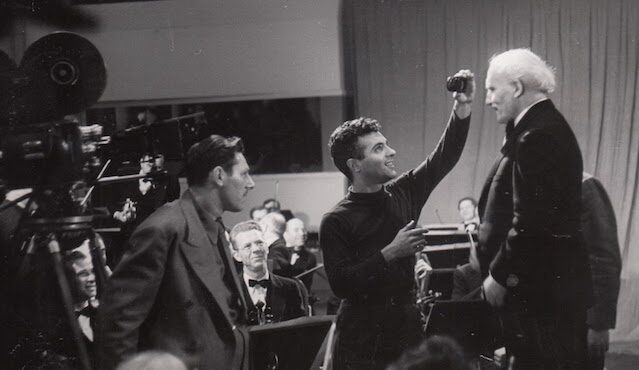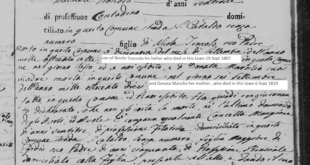The power of movies has proven itself time and time again throughout history. Cinema often mirrors the plights of society or recounts life-changing events. Such is the case with Peter Miller’s documentary film, “Projections of America.”
My first encounter with Miller happened in 2006 when I reviewed his stunning, heartfelt documentary, “Sacco and Vanzetti.” Since then, I have remained in contact with Miller on social media and followed his projects.
One of them is Miller’s 2015 documentary, “Projections of America” in which he focuses on the years immediately following World War II when Hollywood was called upon by the U.S. government to assist in a PR campaign that would shed a positive light on America throughout the world. Frank Capra’s primary screenwriter, Robert Riskin, was put in charge of writing a series of these propaganda films that would be shown to newly liberated countries. After the fall of Mussolini, Italians were presented with a film from this series featuring the famous ex-patriot, conductor Arturo Toscanini.
I really enjoyed this film, so much so that I ended up watching it three times. The first time, I was so impressed by the production quality and blown away by the editing, I missed some of the story. The second time, I just listened and learned about these historic films, which I never knew existed, and the third time, I zeroed in on the film shown in Italy. I asked Miller a few questions about the project. He told me about the importance of his collaboration with his talented editor, Amy Linton, and the process that went into making such a beautiful, compelling film.
Fra Noi: First, just a curiosity about the production process because I really enjoyed the overall creativity of the film, especially the editing with the soft dissolve and the audio mixing and letter-reading. It was really a joy to watch. What is your process of putting a documentary like this together?
Miller: Documentaries find their poetry in the editing room. I’ve been fortunate to have a long, fantastic relationship with the brilliant film editor Amy Linton, who has collaborated with me on five films, including “The Internationale,” “Sacco and Vanzetti,” “Jews and Baseball,” “AKA Doc Pomus” and “Projections of America.” When I’m shooting a film, I’m always thinking about how it will be woven together when we edit. My films are a process of discovery and I don’t map them out ahead of time on storyboards, but I’m always thinking about how the stories I discover will fit together as a dramatic narrative. A documentary may be about an important historical event — like the WWII propaganda film project that’s at the heart of “Projections of America” — but at the core of any effective non-fiction film a story of human beings, with all of the emotion and drama that makes real life — and the movies — so compelling. I found the “Projections of America” films fascinating as a subject, but what really grabbed my imagination were the story’s protagonists, the filmmakers who created the films, the audiences who were moved by them, and especially our central character, Robert Riskin, the Academy Award-winning screenwriter who poured his heart and soul into these amazing movies that still affect us deeply seventy years later.
Tell me about the Toscanini film. Do you know anything specific regarding the reaction in Italy to the film?
Miller: Among the most dazzling of the twenty-six Projections of America documentaries was a short film that paid tribute to the great conductor Arturo Toscanini. The maestro had fled fascist Italy for the United States and Riskin and his filmmaking team recognized that a filmed portrait of Toscanini could be a powerful resource to show to newly liberated audiences in Italy. Millions of Italian filmgoers crowded cinemas to watch the Toscanini film, in which the brilliant conductor led a performance of Verdi’s Hymn of the Nations, updated to include the national anthems of the Soviet Union and the United States. It didn’t surprise me that Italian audiences responded enthusiastically to the film, but what was especially moving to me was meeting a German Jewish woman who survived the war and remembered the powerful emotions she felt watching the film of Toscanini performing Verdi in a bombed out cinema in Berlin.
Would you say that the American propaganda films were similar to what Italy was doing with the Telefoni Bianchi films?
Miller: The Projections of America films were made by liberal American filmmakers who envisioned a pluralistic, democratic, multi-ethnic America — one that presented their nation as it could be if were to live up to its ideals. The filmmakers came from Hollywood — Robert Riskin was the screenwriter of many of Frank Capra’s greatest films — and they came from the progressive documentary tradition of the New Deal era, but they shared a profoundly democratic vision that was expressed in these short films. I’m sure the Projections of America films were a contrast to the kinds of conservative cinema that Italian audiences were accustomed to from the fascist era, and they stood in great contrast to the Nazi propaganda films that were forced upon occupied European audiences. Cinema has the power to change lives and shape minds, both for better and for worse. What draws me to this story is that during the darkest days of global war, the power of the movies was harnessed for such positive messages. The messages in these 70-year-old films still resonate today and can help us think about what kind of country we can be in 2016. Are we a welcoming nation of immigrants or we a belligerent bully? Should we celebrate our diverse culture or should we thump our chest?
To view the documentary, click here.
To follow Miller on Twitter, click here.
To follow Miller on Instagram, click here.
 Fra Noi Embrace Your Inner Italian
Fra Noi Embrace Your Inner Italian







